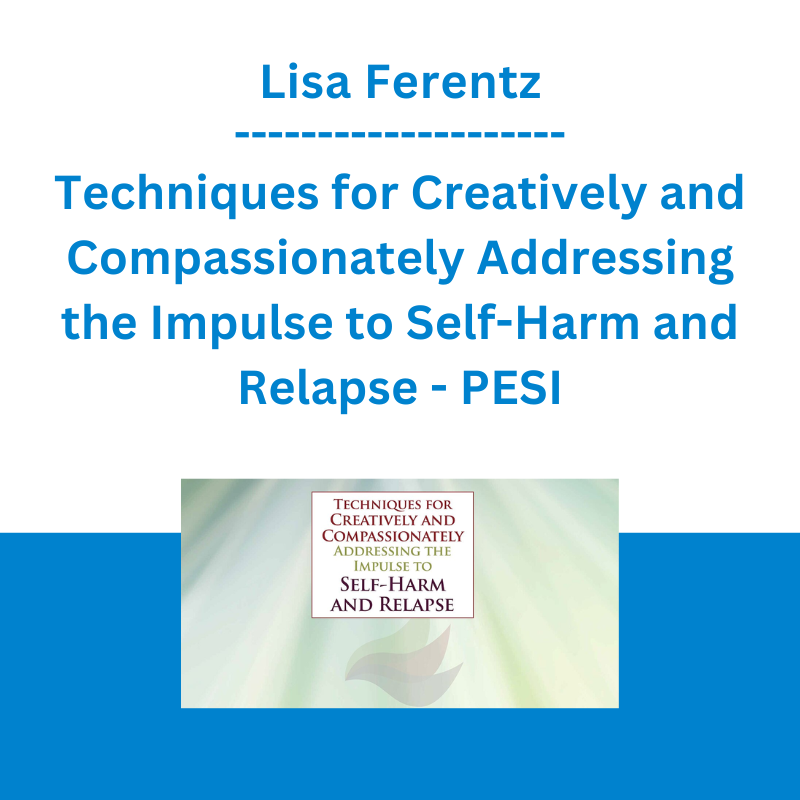*** Proof of Product ***
Exploring the Essential Features of “Lisa Ferentz – Techniques for Creatively and Compassionately Addressing the Impulse to Self-Harm and Relapse – PESI”
Speaker: Lisa Ferentz, LCSW-C, DAPA
Format: Audio and Video
Media Type: Digital Seminar
Description
Many clinicians still insist that clients sign and abide by a standard safety contract as a way to manage self-harm and addictive behaviors. This inevitably creates a power struggle between clients and therapists and forces clients to “white knuckle” their destructive urges without giving them alternative ways to navigate and process the deeper reasons why they turn to acts of self-destruction.
This recording will offer therapists a viable alternative that helps to de-code the deeper trauma-based communication, metabolize emotions, access clients’ creativity and self-compassion, while teaching them healthier ways to self-soothe that don’t lead to an endpoint of guilt or shame.
Speaker
Lisa Ferentz, LCSW-C, DAPA
The Ferentz Institute
Lisa Ferentz, LCSW-C, DAPA, is a recognized expert in the strengths-based, de-pathologized treatment of trauma and has been in private practice for over 35 years. She presents workshops and keynote addresses nationally and internationally, and is a clinical consultant to practitioners and mental health agencies in the United States, Canada, the UK, and Ireland.
She has been an adjunct faculty member at several universities, and is the founder of “The Ferentz Institute,” now in its 12th year of providing continuing education to mental health professionals and graduating over 1,600 clinicians from her two certificate programs in Advanced Trauma Treatment.
In 2009, she was voted the “Social Worker of Year” by the Maryland Society for Clinical Social Work. Lisa is the author of Treating Self-Destructive Behaviors in Trauma Survivors: A Clinician’s Guide, 2nd Edition (Routledge, 2014), Letting Go of Self-Destructive Behaviors: A Workbook of Hope and Healing (Routledge, 2014), and Finding Your Ruby Slippers: Transformative Life Lessons From the Therapist’s Couch (PESI, 2017). Lisa also hosted a weekly radio talk show, writes blogs and articles for websites on self-harm and self-care, and teaches.
Speaker Disclosures:
Financial: Lisa Ferentz maintains a private practice and is the Founder and President of the Ferentz Institute. She receives royalties as a published author and is a consultant for Northwest Hospital. Lisa Ferentz receives a speaking honorarium and product royalties from Psychotherapy Networker and PESI, Inc. She has no relevant financial relationships with ineligible organizations.
Non-financial: Lisa Ferentz is a member of the National Association of Social Workers and the American Psychotherapy Association.
Objectives
- Appraise limitations and risks for the use of standard safety contracts.
- Evaluate the three components of CARESS and how to prepare clients to use the model when they get the impulse to harm themselves or return to their addiction.
- Assess various CARESS techniques and identify at least four open-ended questions that can be used to process clients work.
Outline
Why standard safety contracts don’t work
- evoking power struggles
- re-enacting victim -perpetrator dynamics
- leaving clients bereft of healthy replacements
Incorporating CARESS
- walking clients through the model
- negotiating alternative ways to communicate, release endorphins, and self-soothe
- why contacting the therapist is not a part of the contract
Processing Clients’ artwork
- why therapists’ interpretations are detrimental
- asking open-ended questions to elicit clients’conscious and unconscious communication
- identifying the iconic images that connect to trauma narratives
Target Audience
- Counselors
- Social Workers
- Psychologists
- Psychotherapists
- Therapists
- Marriage & Family Therapists
- Addiction Counselors
- Case Managers
- Physicians
- Nurses
- Other Mental Health Professionals
Please see the full list of alternative group-buy courses available here: https://lunacourse.com/shop/










 The Daily Traders – Exclusive Trading Mentorship Group
The Daily Traders – Exclusive Trading Mentorship Group  Greg Loehr - Advanced Option Trading With Broken Wing Butterflies
Greg Loehr - Advanced Option Trading With Broken Wing Butterflies  Toshko Raychev - Profit System + ITF Assistant
Toshko Raychev - Profit System + ITF Assistant  Crypto Dan - The Crypto Investing Blueprint To Financial Freedom By 2025
Crypto Dan - The Crypto Investing Blueprint To Financial Freedom By 2025  Ed Ponsi - Forex Trading
Ed Ponsi - Forex Trading  SMB - Options Training
SMB - Options Training  Team NFT Money - Ultimate NFT Playbook
Team NFT Money - Ultimate NFT Playbook  Trade Like Mike - The TLM Playbook 2022
Trade Like Mike - The TLM Playbook 2022  Sovereign Man Confidential - Renunciation Video
Sovereign Man Confidential - Renunciation Video  Racing Workshop - Complete Online Package
Racing Workshop - Complete Online Package  Duston McGroarty - Oddball Niche Secrets Coaching Program
Duston McGroarty - Oddball Niche Secrets Coaching Program  Matan Feldman - The 13-Week Cash Flow Modeling - Wall Street Prep
Matan Feldman - The 13-Week Cash Flow Modeling - Wall Street Prep  Alphashark - The AlphaShark SV-Scalper
Alphashark - The AlphaShark SV-Scalper  John Romaniello - Captivating Copywriting
John Romaniello - Captivating Copywriting